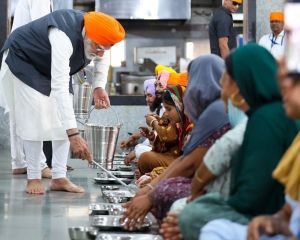Bhagavad Gita is one of the best known religious classic and a highly regarded philosophical treatise. At the same time, it can also be called a perfect guide for healthy and happy living ; and a panacea for all lifestyle disorders. Through a dialogue between Arjuna and Lord Krishna, it has offered a great insight into different aspects of human life. It has also been explained in great detail as to how can one have a healthy body and a happy mind.
Krishna begins his teachings with shloka 2.11 wherein he has assured mankind that there was no cause for grief. The wise grieve neither for the living nor for the dead. It implies that any sorrow was uncalled for. Contentment was the natural state of one’s being. Leading a healthy and happy life was everyone’s right.
Essential to good health is proper diet. In shlokas from 17.7 to 17.10, Krishna has described various kinds of foods and their effects. Corresponding to the three modes of material nature, food is of three kinds. The foods which promote life, vitality, strength, health and cheerfulness ; and which are nourishing, wholesome and pleasing to the heart - such foods are dear to those who are in the mode of goodness (sattvic persons).
The foods that are bitter, sour, saltish, exceedingly hot, pungent, harsh and burning ; and which produce pain, grief and disease are dear to those who are in the mode of passion (rajasic persons). The food which is unclean, half cooked, tasteless, producing an unpleasant smell, stale and which consists of remnants eaten by others - such food is dear to those who are in the mode of ignorance (tamasic persons).
The foods in the mode of goodness promote strength and vitality, those in the mode of passion cause distress and disease ; and those in the mode of ignorance result in misery.
As the human body is made of food, quality of the food taken is of utmost importance. The kind of diet one takes has a great influence on one’s overall personality. One must, therefore, eat not only to gratify one’s tongue ; but also for the enhancement of his vital energy. And anything one eats must first be offered to the Supreme Lord.
Not only quality, but also the quantity of food taken is very important for good health. In shlokas 6.16 and 6.17, it has been advised that one should be regulated in eating, sleeping, waking and recreation. In other words, over indulgence in or total abstinence from any of these activities is harmful to the health. Moderation is the key to happy living. One must learn to exercise restraint.
Gita has also highlighted the importance of action. In shloka 3.8, it has been stated that without action, one cannot even maintain one’s physical body. By action, Krishna does not mean any action. In shloka 4.17, he says that one has to understand as to what is right action, what is wrong action ; and also what is inaction. In the context of healthy living, it means that one should involve himself in those activities which promote good health ; and must avoid those which are harmful.
To put it in simple words, for maintaining good physical health, one must have a balanced and nutritious diet and exercise regularly. Junk food, over-eating, excessive fasting and sedentary lifestyle must be eschewed.
Physical health is only one aspect of overall well-being. Equally important, if not more, is the mental health. Only a knowledgeable, relaxed and stable mind can handle effectively the physical viruses and emotional stresses of life. Gita has explained in detail as to how can such a serene and disciplined mind be obtained.
Through multiple shlokas, it has been elaborated as to how one can overcome fear, greed, anger, envy, anxiety ; and grief. How can one curb the lust, through control of the senses. How can one cultivate equanimity of mind. How can one remain content in himself. How can one attain perfect calmness of mind. How can one be free from doubt ; and gain self-confidence. Once such a discipline of the mind is obtained, one gets rid of self-indulgent habits through the power of his mind.
Gita has also recommend pranayma and meditation for blissful living. Regulation of the breath and concentration of the mind brings cheerfulness. One becomes joyful from within.
Apart from the body and the mind, Gita has thrown ample light on the metaphysical concept of jeevatman, the self. When one understands that his true nature is the self, which is the imperishable and eternal reality behind his physical existence, then he transcends all sufferings associated with the body and the mind. He overcomes the fear of old age and death. He can then appreciate the real meaning and purpose of life.
With such a strong body, serene mind and pure soul, one can effectively cope up with any stressful situation. No lifestyle disorder or psychosomatic disease can impact him for long. He can, thus, lead a healthy and happy life. Spiritual lifestyle is a blissful lifestyle.

























